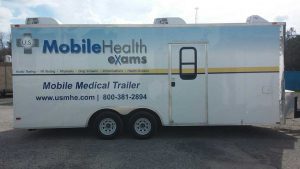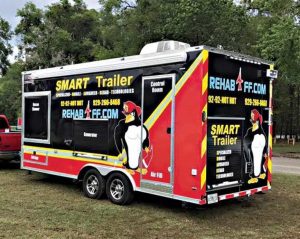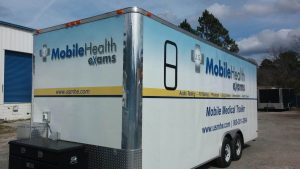
Mobile medical trailer built by MR-Trailers.com.
A new mobile medical unit costs roughly $45,000. Depending on what goes in, a modest buildout would cost between $50,000 and $75,000. Depending on the size, extras, and amenities included, a well-equipped unit could cost anywhere between $175,000 to $375,000.
However, if you want to know how much goes into each component of a mobile medical vehicle, here are some ideas for your reference. The total cost of the equipment installed will play the biggest factor in the total cost. You can estimate the cost of your build by figuring out the specific equipment you need installed.
At MR-Trailers.com, we serve the medical industry by manufacturing mobile medical units for doctors, dentists, and other health specialists. Give us a call at 904-397-0246 or email us here for help planning your build. We offer free design blue-prints for all medical units.
Essential Medical Equipment. These are the fundamental equipment you need in order to identify your van as a mobile medical unit.
General Medical Instruments- $10,000 – $20,000
Multiple Medical Kits – $500 – 2,000
Thermometer – $30 – $100
Weighing Scale – $100
Stethoscope – $50 – $100
Wheelchair – $500
Ultrasound Machine – $3,000
Oximeter – $100
Portable Dental X-Ray Unit – $1,000
Vaccine Transport Box – $100
Pharmacy – $10,000
Exterior Styling And Marketing. Before you operate a mobile medical van, it should look like one. Exterior finishing is essential in designing your mobile medical unit. Couple this with good marketing by way of stickers such as body wraps that can instantly give out that professional medical facility.
If you’re seeking to promote your mobile healthcare services, a body wrap acts as a moving billboard. There are design and wrapping expenses, as well as numerous choices for the wrap’s longevity, to consider when purchasing a full-body wrap. The cost of a full-body wrap for a 53 ft. (16 Mtrs.) double expandable trailer ranges from $12,000 to $25,000 USD, depending on the design intricacy. The cost of the wrap includes the design, bespoke graphics, materials, and labor.
U.S. Federal Excise Tax. In the U. S., you’ll have to settle Federal Excise Tax (FET), which is 12percent of the purchase price and should be acquired and paid by the vendor, just like sales tax. FET is required on the initial retail sale of cars with a GVWR of moreover 26,000 lbs. There still are, however, a few exceptions:
- Exemptions apply to vehicles that will not be used in the United States.
- The trailer maker may not be compelled to collect FET if you can show that you are registered to collect FET and that your purchase is for resale. You will, though. For further information, see your tax advisor.
- Travel trailers and motorhomes are exempt from this rule. The issue is how much of a customized trailer is used to move freight and how much is used to accommodate persons. The IRS issues individual rulings to each producer in this regard. As a result, it’s likely that some of your trailers will be taxed and others will not.
- Government agencies at the state and local levels are exempt, but not at the federal level.
Mobile medical vans or and on-site medical clinics have never been more important in the 21st century than in this time. The current pandemic has put the world on its knees, bringing down economies and overwhelming much of the health care systems around the world. Especially now that vaccines are being rolled out to help arrest the spread of covid, mobile medical vans are vital in delivering these vaccines as well as utilizing these vehicles as support for key health facilities that may not reach individuals on time.
Community health initiatives can increase their reach by bringing health services to underprivileged communities and those living in distant regions. Rural and distant areas can get medical services that they might not have access to otherwise by allowing doctors and medical professionals to give medical treatment outside of local institutions.
Mobile medical clinic vans are often equipped with a basic doctor’s office layout, allowing for on-site patient tests, door-to-door consultations, mental health counseling, and other services. Most mobile medical vans are intended to fit a wide range of applications because of their adjustable layouts, equipment, and combinations.

Rehab Trailer built for fire department by MR-Trailers.com.
Different Types Of Mobile Medical Units
If you’re thinking that all mobile medical vans are built the same, think again. Since mobile medical vans are like mobile doctor’s clinics that can serve people in their communities, especially those who do not have immediate access to these facilities, mobile medical vans can serve as an extension of a doctor’s clinic of any specialization. Here are some examples of mobile medical vans which can be used by any doctor according to their specific specialization.
1. Mobile General Medicine Clinics
This General Outpatient Clinic is dedicated to the care of outpatients and has been created specifically for them. This mobile general medicine clinic offers a controlled, safe, and hygienic operational environment for the healthcare professional to give primary care services to patients such as routine, preventative medicine, and urgent medical attention.
Diagnostic and preventative health services are two types of therapies that might be used (i.e. blood tests, electrocardiography, immunizations, and the diagnosis, prevention, and treatment of diseases).
2. Mobile Dental Facilities
The Mobile Dental Facility is meant to serve as a mobile dental clinic. This mobile dentistry unit must be heavy-duty, tough, and movable, with four-wheel drive. It is able to travel the most inhospitable road networks in order to provide dental care and treatment to the most isolated individuals and localities. Besides its remote capacity, it is still meant to give a dentist and dental hygienist a safe and secure mobile dental clinic for the evaluation, management, and treatment of illnesses, disorders, and conditions of the oral cavity (tooth decay and gum disease or pyorrhea).
Restoration of teeth, extraction or surgical removal of teeth, scaling of teeth, and root canals are all dental treatments that may be performed swiftly and successfully inside these mobile dental clinics.
3. Mobile Radiology Facilities
The Mobile X-Ray Facility is a particularly built radiological clinic that uses x-rays to see a non-uniformly region of the body. Pneumothorax and Pneumoperitoneum, Corpus Alienum (foreign body), Abdominal Discomfort, Lower Respiratory Tract Infections (pneumonia, tuberculosis), Stones, and Bone Fractures are among conditions that can be diagnosed using an x-ray.
These facilities can also be utilized to provide mobile MRI services. MRI scans have high contrast, allowing doctors to view fine features in soft tissue, bone, joints, and ligaments. Since MRI, unlike radiography and CT, does not utilize ionizing radiation to obtain pictures, it is frequently used to examine the male and female reproductive systems, pelvis and hips, and urethra and bladder.
4. Covid-19 Mobile ICU Facility
Though fairly recent, mobile medical vans can also be used as covid-19 mobile ICU facilities. These facilities are designed not just to combat COVID 19 now, but also to prepare for pandemics and natural calamities in the future. They’re also great for adding to ER capacity during flu season.
These are neither camps, portable units, or containers, but highly developed medical units that fulfill healthcare facility requirements, rather than the “Makeshift” hospitals that are springing up in tents and warehouses around the country.
5. Mobile Laboratory Facilities
Mobile laboratory facilities are intended to function as a full-service laboratories. This mobile laboratory may be added to any brick and mortar hospital as a supplement or replacement for the existing laboratory (inside the hospital). It may also function independently as a laboratory. Any sort of test may be performed with this transportable laboratory. Any test equipment that is needed will be integrated according to your specifications. These can even turn parts or the entire trailer into a clean room for specific testing.
These mobile labs are built primarily as a laboratory environment where tests may be conducted (on clinical specimens) to provide data about a patient’s health in terms of illness detection, management, and mitigation. There are two divisions to these laboratories (Anatomic Pathology and Academically). Anatomy, physiology, histology, pathology, and pathophysiology might be included in the Anatomic portion, as well as histopathology, cytopathology, and electron microscopy in the Academic section.
6. Mobile Surgical Facility
These Mobile Surgical Facilities can be much more than just a surgical unit on wheels. It’s a full-fledged transportable surgical operating room. Mobile surgical facilities should be compliant with the United States healthcare code, state-licensed, and Joint Commission-accredited.
Despite its sophistication, this extremely transportable surgical center can be set up and ready to serve patients in less than an hour. As a result, this mobile surgery unit is geared for any operation (domestic or foreign, routine or emergency surgery, natural or man-made calamities).
7. Mobile Dialysis Facilities
Dialysis Facilities are specifically constructed to deliver the highest level of dialysis therapy to patients with kidney disease. Hemodialysis (3-4 times per week) is now the most frequent therapy for people with persistent kidney failure caused by renal disease. For patients who are unable to receive treatment at big regular dialysis centers, mobile dialysis facilities can be advanced mobile systems for hemodialysis therapy.
The sole distinction between mobile dialysis facilities and huge permanent brick-and-mortar dialysis clinics is their mobility. The degree of care, quality, and conformity to US construction rules are all the same.
8. Mobile Emergency Room Facilities
Patients in need of rapid medical care as a consequence of trauma or other life-threatening disorders can be treated in the Mobile Emergency Room. This facility’s only purpose is to stabilize the patient before transferring him or her to surgery or critical care. Despite the ER’s capacity to stabilize critical patients, it may also be utilized to treat patients who require basic care for a variety of ailments ranging from the minor to the severe.
Mobile Emergency Rooms (ER) are full-service emergency operations centers. A specialist admissions space is frequently available at mobile ERs for the management of “walk-in” patients requiring emergency medical attention but may not have an appointment to be taken to the hospital.
9. Mobile Hospitals
Mobile Hospital Complexes are a type of modular general hospital that is built up to treat a wide range of diseases and injuries, and it generally includes an emergency room to handle life-threatening situations. A state-of-the-art mobile hospital can be built using modular facilities to serve the local population. Because they are modular, they may be combined with other movable facilities to create a comprehensive mobile hospital complex that fulfills the needs of a community.
These mobile facilities, mobile field hospitals, or mobile clinics are ideal for responding to environmental and man-made catastrophes (earthquakes, typhoons, hurricanes, tornadoes, and others) ( terrorist attacks or war).
10. Ambulances
The most common type of mobile medical vehicle. Ambulances are intended primarily for an emergency response to correctly deal with accidents or to manage and safely transfer patients associated with the non and normal medical trips to life-threatening situations.
Ambulances respond to all sorts of situations promptly and efficiently or provide Emergency Medical Technicians (EMTs) with a safe, quick, and convenient means to transfer patients to the hospital or other emergency medical services (EMS) systems. These ambulances are also supplied with additional critical care medical equipment and bandages to offer first responders/EMTs the first aid supplies they need to assist patients and monitor their vital signs.

Considerations And Options In Obtaining And Operating Mobile Medical Vans
Getting A Vehicle And Fixing It Up. The first thing you may have to consider is how to obtain and refit a van to be used as a mobile medical facility. Either you buy a new one which is the logical option, or you may purchase a used one, but make sure the vehicle is mechanically sound given the medical purpose of the vehicle. If funding is an issue, you may look for the assistance of foundations or private corporations by raising the funds you need to put up one.
Identify And Confirm The Need. Gather information from patients and people of the community about their needs and the best way to address them. Preventative health, general care, mammography, dentistry, specialist medical care, homelessness, and other services are all available through vans across the country. Your van’s services should be tailored to the community’s most pressing requirements.
Identify Your Target Community. Determine which comparatively low-income and minority populations have a considerable risk of illness and thus would benefit so much from care delivered by a mobile clinic. Even the simplest mobile medical van would bring enormous assistance and relief to these communities.
Partner With Community Organizations. Coordination with neighborhood health clinics, rehabilitation centers, social service organizations, and local charities allows for referrals of clients who require support beyond the mobile clinic’s capabilities, as well as aid in developing the program’s model.
Employ A Culturally Competent Staff. Patients of mobile clinics may come from a variety of socioeconomic backgrounds and have a variety of cultural values. Employees who practice a “knowledgeable neighbor” approach of courteous, non – judgemental care can foster a trusting atmosphere.
Determine Suitable Parking Location/s. Collaborate with local residents to locate suitable, easy-to-reach parking spots for the van in each town. Other than complying with local ordinances, parking your mobile medical van in a proper spot to reach your intended target community is the best way to operate your mobile medical van vocation.
Additional Services. Discuss with your clients on a regular basis to determine any community needs you’ve seen, as well as the benefits and feasibility of establishing new services to meet them. In this way, the services you offer would not stagnate and you’ll be able to meet the specific needs of each patient.

Leave A Comment